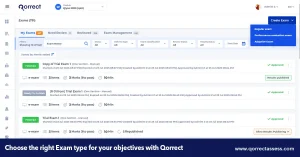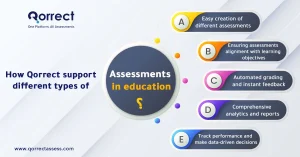Understanding the different types of assessments in education is very important for designing effective evaluations that actually reflect student performance. With the increasing need for accurate and instant assessments, Qorrect platform supports professors to create, manage, and analyze different assessment methods accurately. Whether it’s formative vs summative assessment, or other educational assessment tools.
From presenting practical assessment examples to offering innovative assessment techniques, Qorrect ensures that every assessment supports a clear purpose in enhancing student achievement.
Table of Contents
What’s the Assessments in Education?
Assessments in education are essential tools and processes used to measure students’ skills, knowledge, and overall learning outcomes. Different types of assessment in education help professors evaluate whether learning objectives have been achieved and support future teaching strategies. The different types of assessments in education offer outstanding and vital purposes, some are designed to monitor outstanding learning, while others focus on evaluating the results after implementing the instructions.
Different types of assessments in education go beyond assigning grades, they are about providing feedback, identifying learning gaps, and supporting student growth. With Qorrect platform, professors can easily create, deliver, and analyze assessments specialized for specific learning goals, ensuring that each evaluation leads to meaningful insights.
What’s the Purpose of Different Types of Assessments in Education?
The different types of assessments in education are considered as important tools for guiding both teaching and learning. Each type of assessment specializes in specific goals, helping professors evaluate student understanding and performance. The right assessment example ensures effective measurement of learning objectives.
Key purpose of different types of assessment in education:
- Measure student learning and mastery of academic subjects.
- provide professional feedback for both professors and students.
- Identify strengths and weaknesses points to customize teaching strategies.
- Support curriculum development and instructional strategies.
- Ensure responsibility in educational institutions.
With Qorrect platform, professors can design, manage, and analyze different assessments professionally. Different types of assessment for learning enhancing educational outcomes and fostering student success.
Norm-Referenced vs. Criterion-Referenced Assessments
When discussing the different types of assessment in education, it’s important to know two main categories of assessment: norm-referenced assessments and criterion-referenced assessments. Both are fundamental to the academic evaluation, but each one serves different purposes.
- Norm-referenced assessments measure a student’s performance in comparison to a large scale of other students. These assessments rank students and often help in placement decisions.
- Criterion-Referenced Assessment measures a student’s performance against a fixed set of standards or target learning objectives. This type of assessment determines whether specific skills or knowledge have been mastered.
| Norm-Referenced Assessments | Criterion-Referenced Assessments |
| Compare a student’s performance to a group of peers | Measure a student’s performance against defined criteria |
| Focus on ranking and placement | Focus on mastery of specific skills or learning outcomes |
| Examples of Norm-Referenced Assessments: standardized tests, aptitude tests. | Examples of criterion-referenced Assessments: course exams, skill-based test, proficiency exams |
| Scores are relative to the group average | scores are based on fixed standards or benchmarks |
| Use for selection, placement, and competitive ranking | Use for measuring learning progress, curriculum alignment |
With Qorrect platforms, professors can easily design different types of assessments in education effectively, making sure that assessments align with learning goals and objectives.
How to choose the Right Assessment Type for Your Objectives?
In the case of choosing the right type from the different types of assessments in education, we must depend on learning objectives and what we want to measure. In most cases, not every assessment fits every educational goal, but making the right choice is key to accurate results.
Here’s how to choose the right assessment for your objectives:
- Formative assessments: Used for monitoring ongoing learning and providing continuous feedback, and guiding student improvement.
- Summative assessments: Using for evaluating outcomes and measuring achievement at the end of a course.
- Norm-referenced assessments: using for ranking students against peers and comparing performance within a group.
- Criterion-referenced assessments: using for measuring mastery of skills or standards and focused on specific learning objectives.
With Qorrect platform, professors can easily align assessments with objectives, ensuring that each test, quiz, or evaluation accurately reflects student performance and supports educational success.

Types of Assessments Used in Higher Education
In higher education, choosing the appropriate assessment method is essential for accurately measuring student learning outcomes. Understanding the different types of assessment in education supports universities in creating evaluations that cover different learning needs.
Different types of assessments in education:
- Formative Assessments: providing outstanding feedback to guide students’ learning during the course.
- Summative Assessments: Evaluate student performance at the end of an educational program.
- Diagnostic Assessments: Identify students’ essential knowledge, strengths and weaknesses, and skills before instruction begins.
- Performance-Based Assessments: Require students to complete tasks that show their understanding.
- Self and Peer Assessments: Encourage reflection and collaborative evaluation among students.
- Norm-referenced assessment: Compares a student’s performance to that of peers.
- Criterion-Referenced Assessment: Measures a student’s performance against a specific set of learning objectives.
- Ipsative Assessment: Compares a student’s current performance with their previous results to track growth.
With Qorrect platform, professors can design, manage, and analyze different types of assessments in education with a single platform. Qorrect ensures every assessment supports clear learning objectives and enhances student performance.
How Qorrect Support Various Types of Assessments Effectively?
Managing the different types of assessments in education needs tools that offer flexibility, accuracy, and efficiency. Qorrect platform plays a vital role in making a difference in managing assessments effectively. Whether educational institutions apply formative or summative assessments or work with norm-referenced evaluations or Criterion-Referenced, Qorrect helps professors streamline the entire assessment process effectively.
Here’s how Qorrect support different types of assessments in education:
- Easy creation of different assessments.
- Ensuring assessments alignment with learning objectives.
- Automated grading and instant feedback.
- Comprehensive analytics and reports.
- Track performance and make data-driven decisions.

Depending on Qorrect platform universities can ensure that different types of assessments in education are designed and analyzed with maximum effectiveness.
Don’t miss the chance to be part of Qorrect’s educational community.
FAQ:-
How many types of assessment are there in education?
There are several different types of assessments in education, each serving unique purposes depending on the learning context. The most common categories include: Formative Assessment – Summative Assessment – Diagnostic Assessment-
Norm-Referenced Assessment- Criterion-Referenced Assessment-Ipsative Assessment
What are the 4 Techniques of Assessment?
In the context of the different types of assessments in education, there are four widely recognized techniques that professors use to evaluate student learning effectively: Observation, Oral Questioning, Written Tests and Assignments, Performance-Based Assessment.
By combining these four techniques, educators can create well-rounded evaluations tailored to diverse learning outcomes.
How Can Technology Enhance Assessment in Education?
Technology enhances the effectiveness and efficiency of different types of assessments in education, including formative, summative, diagnostic, and performance-based assessments. Here’s how: Automated Grading, Instant Feedback, Data-Driven Insights,
Adaptive Testing, Remote Exam Delivery, Alignment with Learning Objectives
 Qorrect Blog
Qorrect Blog






